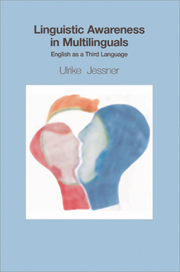Book contents
- Frontmatter
- Contents
- List of figures and tables
- List of abbreviations
- Acknowledgements
- Introductory remarks
- 1 Multilingualism with English
- 2 Learning and using a third language
- 3 On the nature of linguistic awareness
- 4 Exploring linguistic awareness in third language use
- 5 Crystallizing linguistic awareness in multilingual education
- 6 Envoi
- References
- Index
4 - Exploring linguistic awareness in third language use
Published online by Cambridge University Press: 05 September 2013
- Frontmatter
- Contents
- List of figures and tables
- List of abbreviations
- Acknowledgements
- Introductory remarks
- 1 Multilingualism with English
- 2 Learning and using a third language
- 3 On the nature of linguistic awareness
- 4 Exploring linguistic awareness in third language use
- 5 Crystallizing linguistic awareness in multilingual education
- 6 Envoi
- References
- Index
Summary
The aim of this chapter is to provide evidence of linguistic awareness as an essential component of multilingual proficiency. The major part of the discussion is based on introspective data taken from bilingual (Italian- German) students of English at university level in the Tyrol study. To explore the multilingual informants' use of certain problem-solving behaviours, think-aloud protocols were used during the process of academic writing. The kind of compensatory strategies that the students chose to overcome the lexical deficits in their third language will be analyzed to find out about other language use and how this use interacts with metalinguistic awareness.
The chapter begins with a review of some international studies on the multilingual lexicon which will be presented as an introduction to the Tyrol study on the use of English as a third language. After providing the theoretical and methodological background of the study, the three main research questions will be the subjects of detailed focus. Finally, the findings of the study and some implications for future studies will be presented.
CROSS-LEXICAL CONSULTATION IN MULTILINGUALS
This section focuses on multilingual studies of language mixing resulting from linguistic search in various settings. Since many of the relevant studies are introspective in nature, our discussion will start with some remarks on the methodology of introspection and then move on to an overview of relevant investigations in this research area.
- Type
- Chapter
- Information
- Linguistic Awareness in MultilingualsEnglish as a Third Language, pp. 72 - 119Publisher: Edinburgh University PressPrint publication year: 2006



